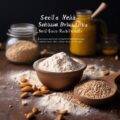What is Apple Flour and Why is it Gaining Popularity?
Apple flour is an innovative and nutritious ingredient that’s been steadily rising in popularity among health-conscious consumers and bakers alike. Made from finely ground dehydrated apples, this versatile flour offers a delightful way to add natural sweetness, fiber, and nutrients to baked goods and other recipes. As more people seek out wholesome alternatives to refined flours, apple flour has emerged as a compassionate choice – both for our bodies and the environment.
The growing interest in apple flour stems from several factors:
- It’s naturally gluten-free, making it suitable for those with celiac disease or gluten sensitivities
- Apple flour is rich in fiber, vitamins, and antioxidants
- It has a lower glycemic index compared to wheat flour
- Apple flour adds delicious flavor and moisture to baked goods
- It’s a sustainable way to reduce food waste by using imperfect apples
The Nutritional Benefits of Apple Flour
Incorporating apple flour into your diet can offer numerous health benefits. This nutrient-dense ingredient is packed with essential vitamins, minerals, and dietary fiber. Here are some of the key nutritional advantages:
- High in fiber, which aids digestion and promotes feelings of fullness
- Rich in antioxidants like quercetin, which may help reduce inflammation
- Contains vitamins C and A, supporting immune function and skin health
- Provides essential minerals like potassium and calcium
- Naturally low in calories and fat
By choosing apple flour, you’re not only nourishing your body but also embracing a more compassionate approach to eating. This wholesome ingredient allows you to enjoy delicious treats while supporting your overall wellbeing.
Baking with Apple Flour: Tips and Tricks
Experimenting with apple flour in your baking can lead to delightful and nutritious creations. Here are some helpful tips to get you started:
- Start by substituting 25-30% of the regular flour in your recipes with apple flour
- Adjust liquid ingredients as needed, as apple flour absorbs more moisture
- Combine apple flour with other gluten-free flours for best results in gluten-free baking
- Use apple flour to add natural sweetness, reducing the need for added sugars
- Experiment with different apple varieties to create unique flavor profiles
Remember, baking with apple flour is an opportunity to explore new flavors and textures while nourishing your body and soul. Embrace the process with curiosity and compassion, allowing yourself to learn and grow as you discover the joys of this unique ingredient.
Sustainable Living: The Environmental Impact of Apple Flour
Choosing apple flour isn’t just good for your health – it’s also a compassionate choice for the planet. The production of apple flour often utilizes “ugly” or imperfect apples that might otherwise go to waste. This practice helps reduce food waste and supports a more sustainable food system.
By incorporating apple flour into your cooking and baking, you’re participating in a larger movement towards more eco-friendly food choices. This simple switch can have a ripple effect, inspiring others to consider the environmental impact of their food choices and embrace more sustainable alternatives.
Creative Recipe Ideas Using Apple Flour
The versatility of apple flour opens up a world of culinary possibilities. Here are some inspiring recipe ideas to get your creative juices flowing:
- Apple Cinnamon Muffins: Replace a portion of wheat flour with apple flour for extra flavor and nutrition
- Gluten-Free Apple Crisp: Use apple flour in the topping for a delicious twist on this classic dessert
- Apple Flour Pancakes: Create fluffy, nutritious pancakes with a subtle apple flavor
- Homemade Granola: Incorporate apple flour into your granola mix for added sweetness and fiber
- Apple Flour Energy Balls: Combine apple flour with nuts, dates, and spices for a healthy snack
As you explore these recipes, remember that cooking and baking can be acts of self-care and love. Approach your time in the kitchen with mindfulness and joy, savoring the process of creating nourishing food for yourself and others.
Frequently Asked Questions About Apple Flour
1. Is apple flour completely gluten-free?
Yes, pure apple flour is naturally gluten-free. However, always check the label to ensure it’s processed in a gluten-free facility to avoid cross-contamination if you have celiac disease or severe gluten sensitivity.
2. Can I replace all the wheat flour in a recipe with apple flour?
It’s generally not recommended to replace all wheat flour with apple flour, as it can significantly change the texture and structure of baked goods. Start by replacing 25-30% of the wheat flour and adjust as needed.
3. How should I store apple flour?
Store apple flour in an airtight container in a cool, dry place. For longer shelf life, you can keep it in the refrigerator or freezer.
4. Does apple flour have a strong apple flavor?
Apple flour has a subtle, sweet apple flavor that can enhance baked goods without overpowering other ingredients. The intensity can vary depending on the apple variety used to make the flour.
5. Where can I buy apple flour?
Apple flour is available at many health food stores, specialty baking shops, and online retailers. You can also make your own by dehydrating and grinding apples at home.
As we embrace the rise of apple flour, let’s remember that every small choice we make in our diets can contribute to a healthier, more compassionate world. Whether you’re baking for yourself, your family, or your community, using apple flour is a delicious way to nourish bodies and souls while treading lightly on the earth. Happy baking!









